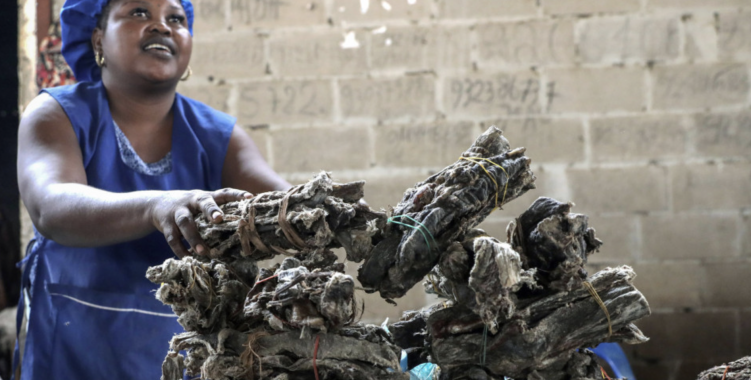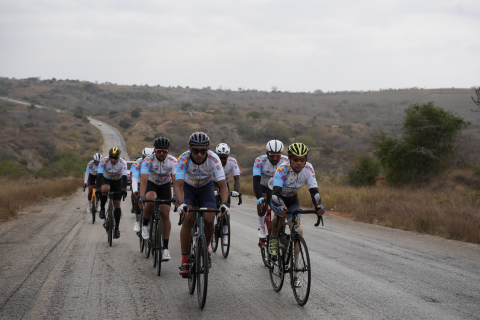At Mercado do 30 in Luanda, Fifi Ernesto sells smoked meat from wild boar, deer and cambuíge (a large rodent), and dismisses the risks associated with the disease popularly known as "monkey pox" in its handling.
"It's a lie that game meat causes diseases. For example, I [think that] chicken thighs and fish are food for children. I always prefer game meat with other vegetables because it's natural," assured Fifi, 39, as she arranged the counter with huge quantities of smoked meat.
The dried and smoked meat section, especially game, is mainly visited by women in this huge market in the municipality of Viana, which is 30 kilometres from the centre of Luanda, where mpox is not a topic of conversation.
There you can find a variety of smoked game meats, from deer and wild boar, seixa (a type of small antelope) and cambuíges (which are among the most sought after), but monkey meat is scarce, despite the customers' appetite.
"Monkey meat is rarely found here, because the vendors no longer bring it," added Fifi.
For the vendor, who has been working at that market for eight years, where dried, fresh and smoked meat is exposed to flies and dust, without the recommended hygiene conditions, the product she sells does not pose a risk of disease.
"We preserve the meat well, we don't know how it is preserved where it comes from [inland Angola], but here in our hands, if it is wet it must be cooked [to protect it from parasites] and prevent it from rotting," she explained.
Cristina Afonso, 61, who lives in the province of Cuando-Cubango but sells smoked game meat at the Mercado do 30 in the capital, is also unaware of the risks of mpox.
“I haven’t heard about this disease yet,” she said when asked about mpox, but assured us that she does not sell monkey meat, despite the demand.
“There are people who eat it, but since I don’t eat it, I don’t buy it to sell,” she explained, adding that the deer and wild boar meat she sells is purchased from hunters in Cuando-Cubango, a province with an abundance of forests, parks and conservation areas.
Salt water is the main method of preserving this type of meat, to prevent rodents and worms from contaminating the product.
This meat is soaked (in salt water) and then exposed to the sun before being stored to protect it from vermin, explained Cristina, while also lamenting the reduction in customers in what is considered one of the largest open-air markets in Luanda.
Four halves of smoked meat are currently being sold for 15,000 kwanzas.
Iraulo Teka, one of the few game meat consumers in the area, admitted to being unaware of the risks of mpox, asking for more information from the health authorities about the disease, which has its epicentre in the Democratic Republic of Congo, which shares a long land and sea border with Angola.
"I still don't understand this [about mpox], but the authorities who analyze what comes in here and we consume should know best," he noted, while at the same time guaranteeing that game meat, especially wild boar, his favourite, "is the best."
Teka, originally from the province of Zaire, in the north of Angola, recalled that he was born in the villages and that game meat "is the best food".
"We are just consumers and we are not afraid. When the hunter goes out into the bush and comes back [with the meat], that is good consumption for me", he stressed, also complaining about the prices charged there.
In addition to smoked meat, in several places in Angola, especially on the roads leading out of Luanda, it is common to find live and dead wild animals for sale, despite the authorities tightening the crackdown on poaching.
The Ministry of Health announced that the country has not yet recorded any cases of mpox and has developed epidemiological surveillance measures, aiming to prevent possible contagion of the virus, whose resurgence in the Democratic Republic of Congo has already caused more than 500 deaths.
Last week, the ministry reiterated that individual and collective protection measures must be adopted, including not hunting or eating the meat of monkeys and rodents (rats, mice, cambuíge and squirrels) and avoiding direct exposure to the meat and blood of these animals.
The WHO declared the outbreak of mpox in Africa a global health emergency, with confirmed cases among children and adults in more than a dozen countries and a new variant in circulation, considered more dangerous than the one detected in 2022.
The new variant can be easily transmitted through close contact between two people, without the need for sexual contact.







